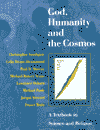A Critique of Willem B Drees’ TypologyWhere Drees’ Typology is too limited is in not acknowledging that the ‘science’ which gives rise to challenges to religions has itself all sorts of different components. Sciences themselves have their traditions. As well as their cognitive claims they have imaginative, indeed aesthetic components which are important in the generation and evaluation of novel hypotheses and models. Drees himself in an earlier book mused that
‘a metaphysics informed by a religious perspective might determine the criteria
for theory development and appraisal.’ More, then, can be said of the positive overlap between scientific and theological positions than Drees allows. To explore the character of the two types of subject further see critical realism in science and religion.
Email
link | Feedback | Contributed by: Dr. Christopher Southgate
|






